Text

taiwanese indie band rec of the week is soulfa靈魂沙發!got to see them live a week ago in taipei, it was awesome :,-) fav songs rn are probably 夏日午睡 & 44 Seconds Road Movie
18 notes
·
View notes
Text

明明 (míngmíng): obviously; plainly; undoubtedly
却 (què): but; yet; however
"What is something you definitely like but can't express?"
9 notes
·
View notes
Text









故宫博物院 2025
Forbidden City, Beijing
Follow for more
6 notes
·
View notes
Photo

Do you want to learn Chinese but you don’t know how to start? That’s the post for you!
Many times I got messages from people who want to learn Chinese Mandarin, but they do not know how to start, what to buy, which website is good or which APP they should download. So I’ve decided to prepare a post where I try to explain as much as I can! Basics about Chinese language, textbooks, useful APPs and websites.
Pinyin 拼音 (pīn yīn) Chinese romanization system
The most important thing is to get familiar with sounds and romanization system of Chinese characters.
I recommend you to watch these two videos below:
initials
finals.
Get familiar with tones too! In Chinese there are 4 tones:
first tone ( ˉ ) called flat or high-level tone 妈 mā
second tone ( ˊ ) called rising or high-rising tone 麻 má
third tone ( ˇ ) called falling-rising or low tone 马 mǎ
fourth tone ( ˋ ) called falling or high-falling tone 骂 mà
plus neutral tone! 吗 ma
If you want to practice your tones and listen to it, I can recommend you this website: Introduction to Tones. 🗣 say initials and finals at loud, 🗣 say at loud every word you learn - multiple times! 🗣 try to record yourself and listen to your audio, 🗣 if you have Chinese friends - send them your audio or try to speak with them, and ask for corrections! 🗣 if you don’t have Chinese friends - you can always send audio to apps like HiNative, HelloTalk or Tandem and see how natives are reacting on your Chinese! 🗣 if you want - you can get Chinese classes - for beginners, it’s a smart move, in my humble opinion (or get a teacher on iTalki).
Characters 汉字 (Hàn zì)
Chinese is a special language because it has characters - not letters. Each character has its own reading and meaning!
For better understanding them, I would like to recommend you to think about them as small pictures! There are two types of writing Chinese characters:
traditional 媽 麻 馬 罵 嗎
simplified 妈 麻 马 骂 吗
The traditional one is used in Taiwan and Hongkong and simplified one is used in Mainland China. You can see that the traditional one are more complicated and have more lines! In the beginning, I’d recommend you to learn 100 most common Chinese Characters. Try to write characters as many as you can - at the very beginning, it’s very important to get used to a new way of writing!
When you are already more advanced and you easily remembered 100 characters, you can read about Radicals - they will help you to understand more advanced characters and how they are constructed.
📖 You can definitely check the book by James Heisig “Remembering the Hanzi”. He had a cool idea of how in an easy way people from outside China (or Japan/Korea) can understand and learn characters!
📝 write, write, write hanzi every day! 📝 try to post pictures of your characters on IG/tumblr or send it to someone who knows how to write them, so they can check it for you and tell you how to improve! 📝 at the beginning every character looks crappy - it’s normal!
HSK exam
You are at the beginning of the journey with Chinese, so I will not talk a lot about the Chinese Proficiency Test (汉语水平考试). The basic thing you should know, there are 6 levels (at the moment there are 6, but they are planning to add 3 more levels for more advanced learners). Each level has a list of characters, words and grammar points you have to know. Don’t bother yourself with HSK exams if you don’t need at the very beginning. I haven’t touch HSK 1, 2 and 3 - I was just studying with my textbooks and I ended up at HSK 5 somehow! :D
Textbooks

At the very beginning, I can recommend you to invest in a textbook. I know a lot of people want to learn for “free” and not to spend a single $… You can always check if your local/academical library has any textbooks! I am a textbook-person, I need at the beginning of any language some books to make myself “into” the language, to feel it and understand basics. Two series of textbooks to Chinese I know and tried are:
New Practical Chinese Reader
Boya Chinese.
Personally, I am a fan of New Practical Chinese Reader. I used NPChR tom 1, 2, 3 and now I’m working with 4th tom! If you already know that you want/need to prepare to HSK exam, then I highly recommend series:
HSK Standard Course!
HSK Vocabulary Book (mini-series).
APPs
Below I’ve mentioned few of apps that I recommend and they are perfect for the start!
📱 Memrise - this app was with me at the very beginning and I still use it! The perfect tool to remember new vocabulary/sentences! There are plenty of official courses created by Memrise app, but also courses made by other users. Official courses have short videos with native speakers, which is a really nice bonus because you can hear REAL people :]
📱 SuperChinese - a very solid app which is going to introduce you to the Chinese language world! They have real-life conversations, teach how to write characters, a function of speech recognition (so you can practice your pronunciation and tones) and many many more functions. Download it and you will not regret it! 📱 Pleco - Chinese-English, English-Chinese dictionary and life-saver. I don’t know any Chinese learner who doesn’t use this dictionary, seriously!
📱 HelloTalk, HiNative, Tandem - all these three apps are good to meet natives! You can find folks from China and talk with them! Personally, I used them a lot at the very beginning. I wanted to see how natives are texting and make some new friends!
📱 APPs (beside Memrise) that help you to learn vocabulary: Anki, Quizlet.
Websites
Excellent websites for beginners are:
Little Fox Chinese
BBC Learn Chinese
Chairman Bao
Yellow Bridge
Chinese Tools
Courses on edX
Courses on Coursera
~ ~ ~ ~ ~ ~ ~ ~ ~ ~ ~ ~ ~ ~ ~ ~ ~ ~ ~ ~ ~ ~ ~ ~ ~ ~ ~ ~ ~ ~ ~ ~ ~ ~ ~ ~ ~ ~ ~ ~ If you find this post useful: like, repost and follow me. And stay tuned for more info! You can also follow my instagram, where I post my everyday struggle with Chinese!
370 notes
·
View notes
Text
A Study Plan for Chinese to HSK 4, then Chinese Content
A study plan to get you to the point you can do something in Chinese, like read novels or watch shows, in 1-2 years.
For Chinese, it is very possible to study HSK 1-3 in a year, then HSK 4 the next year, and then be reading and watching whatever you want by the end of year 2. This could be achieved with a pace of studying around 1 hour a day. As long as you're willing to look up key unknown words to understand the main idea, when reading and watching whatever you want.
In fact, it's possible to study up to HSK 4 in 8 months, this person did it. If you really wanted to study everything up to HSK 4 in that amount of time.
I studied roughly the amount in HSK 4: I read through 800 hanzi entries from an HSK 1-3 Tuttle book (available in many libraries and elibraries for free, alternatively there's a free app Hanly to learn hanzi with mnemonics), all the grammar points on hskcourse.com, cram studied 2000 common chinese words in Ben Whatley memrise decks (anyone looking to do something similar: I suggest doing the first 2000 sentences in Chinese Spoonfed Anki deck, or finding another 2000 common words collection with audio and hanzi), then read a few Mandarin Companion Graded Readers in Pleco app (where I could click unknown words for a translation and pronunciation). I did all of that in roughly 10 months, at ~2 hours of study a day, so not a huge time commitment.
After I could read around ~1000 hanzi, I could move onto reading manhua, whatever webnovels I wanted in Pleco and Readibu apps (I'd recommend Heavenly Path's Comprehensive Reading Guide for more information on how to start reading, and their general site for recommendations at various reading levels), and any cdramas I wanted (using Google Translate and Pleco to look up any unknown words that seemed important to understanding the main idea of a scene, alternatively there's dual subtitle extensions like LanguageReactor that make looking up words easier).
Why aim for HSK 4? HSK 4 has a lot of overlap with the most common words lists, and includes a lot of basic grammar, so either focusing on learning what's in HSK 4 OR a common word list and basic grammar guide, would get you a baseline of knowledge you can then use to start reading/watching whatever you want (if you look up key unknown words).
HSK 4 will get you around A2/B1 level, upper beginner/lower intermediate, and from there you can start just reading and watching things you want. This is the level you want to reach, to be able to start doing things in the language. Once you can do things in the language, it's easier to stay motivated for years, because you can start DOING your goals, and improving at your goals in the language.
You can either look up key unknown words (which unlocks virtually all stuff made in Chinese), or you can continue with Graded Readers (Mandarin Companion, Rainbow Bridge Readers, Sinolingua, Imagin8 Press, etc.), Comprehensible Input Lessons (Lazy Chinese, Blabla Chinese, Xiaogua, list of more), podcasts for learners (Maomi Chinese, Teatime Chinese, Chinese with Shenglan, Chinese with Da Peng, Dashu Mandarin, Mandarin Corner, etc.), and keep using these materials you find understandable until you feel up to reading/watching novels and shows.
If you want to start speaking, HSK 4/2000 common words will give you a good foundation to start chatting with a tutor (iTalki or wherever you can find one), or start doing language exchanges (like on Hellotalk etc.) where you message people and chat with people. You can look up words you don't know, that others say/message to you, and look up words you want to say to others to prepare to talk to/message them, and get lots of practice interacting with people.
Rambling below:
This was my study plan, and it worked great, I could start reading and watching things I wanted by 6 months and then reading/watching some stuff extensively (not needing word lookups all the time) by around 2 years. I've seen many people on reddit r/ChineseLanguage do the Heavenly Path Comprehensive Reading Guide study plan, and successfully start reading webnovels within 3 months to within 2 years. If you're willing to look up unknown words, the timeline for starting novels and shows can be as short as you feel comfortable. My suggestion above to study to HSK 4/2000 common words is just because that foundation will then make reading/watching things significantly easier to start doing, since you'll have some familiarity with a lot of the most common words you'll run into.
After studying to HSK 4/2000 words, expect the first few months of actually 'using' Chinese to feel rough, mentally draining, and you'll be 'reviewing' all the stuff you learned mostly. Especially if you cram studied - the first few months you encounter all those words and grammar you studied in real novels and shows (or in Graded Reading, Comprehensible Input Lesson type materials) you'll just be learning to recognize/understand those words and grammar quicker. So give yourself some slack, do not expect perfection, it will take a while to align 'what you studied' with 'what you can understand and use quickly.' When I started watching cdramas 6 months into studying, it felt immensely mentally draining and I could only handle 5 minutes at a time, it took a few months for me to feel able to watch a full 40 minute episode, and then another year for it to feel easier (and now that I'm focusing on listening instead of Chinese captions, it's again feeling mentally 'draining' to watch with only the audio to rely on). When I started reading Chinese webnovels, it took 2 hours to get through a 4000 character chapter. Then 1 year in, it took 30-50 minutes. Then 2 years in, it finally took 20 minutes to read 4000 characters.
Just because you studied something (or learned it from extensive listening - Comprehensible Input Lessons, or extensive reading - Graded Readers) does not mean it will be easily quickly understandable immediately when you encounter what you studied in other contexts. So give yourself a lot of hours to adjust. Reading itself is a skill, listening itself is a skill, and you'll need a lot of practice to develop those skills and the stamina to do them for long periods of time.
101 notes
·
View notes
Text
Mandarin resources (free) Beginner.
Index for the post:
- HSK word list -
Apps
Book recs
Dictionaries
Extensions (Chrome-Firefox)
Flashcards
Grammar
Input (Reading/Videos/TV shows and Films)
Phonetics
Pinyin
Sentences
Tones
Web courses
Youtube channels (Teaching / other)
- Other -
Last edited / updated: 12 / Feb / 2025 = (edit 19)
* is for fav resources
- HSK word list -
HSK 1 list in Hsk.Academy: Simplified and traditional + pinyin + exercises + sentences examples. (in spanish)
HSK 2-6 list
1500 Most Common Chinese Characters (edit 17): pinyin + audio + definition + direct link to search in a dictionary.
* Dong-chinese (edit 19) HSK 1-9 + HSK 7-9: word list + dictionary + sentence examples + media examples
Keep reading
2K notes
·
View notes
Link
There are a ton of guides explaining tones, but relatively few explaining Mandarin vowels, dipthongs and consonants.
Pīnyīn vowel pronunciations vary depending on what which consonants they follow, in ways that most pronunciation guides don’t bother to explain in detail. 密 mì rhymes with 皮 pí but not 次 cì. 全 quán rhymes with 选 xuǎn but not 换 huàn.
The rules for how they vary are actually pretty consistent, though.
So. I decided to make a comprehensive Mandarin pronunciation chart, with IPA (International Phonetic Alphabet) symbols, and example words.
You can just copy-paste the words into google translate and listen to the google TTS if you can’t make sense of the IPA symbols
139 notes
·
View notes
Text
Essential vocab for your trip to China

Following my previous post about my trip to China, here are some useful phrases/vocab. I'm focusing on stuff I didn't learn in class or from textbooks—I learned most of these from experience.
借过(借過)jièguò - excuse me (trying to get past someone)
让一让(讓一讓)ràngyíràng - make way; coming through
安检(安檢)ānjiǎn - security check, short for 安全检查(安全檢查)
过安检(過安檢)guò ānjiǎn mean to go through security.
预约(預約)yùyuē - booking / reservation / to book / to make an appointment
In China, some museums require a reservation ahead of time.
扫码(掃碼)sǎomǎ - to scan a QR code or barcode
我扫你(我掃你)wǒ sǎo nǐ - I scan you (your code) 你扫我(你掃我)nǐ sǎo wǒ - you scan me (my code)
Shopping
结账(結賬)jiézhàng - to pay the bill
柜台(櫃檯)guìtái - sales counter; front desk
收银台(收銀台)shōuyíntái - checkout counter; cashier's desk
刷卡 shuākǎ - to pay with credit card
刷 means brush/swipe, but I've also heard this used for tapping with your card.
付现(付現)fùxiàn - to pay in cash
袋子 dàizi - bag
提袋 tídài - bag (with handles)
I'm not 100% clear on what defines 提袋, but it seems like 1) has handles and 2) typically nicer than a standard plastic bag.
纸袋(紙袋)zhǐdài - paper bag
试穿(試穿)shìchuān - to try on clothes
试戴(試戴)shìdài - to try on hats/glasses/etc.
Food
几位?(幾位?)jǐwèi - how many? (people/seats for your table in a restaurant)
堂食 tángshí - to eat in (at the restaurant)
In Taiwan you'll probably hear 内用(內用)nèiyòng instead.
外带(外帶)wàidài - take-out
打包 dǎbāo - to pack up leftovers
取餐 qǔcān - to pick up food
Definitions are adapted from MDBG.
157 notes
·
View notes
Text
chinese idiom: 不三不四

不三不四 is a chinese idiom that literally means “not 3 neither 4″ and it means neither one thing nor the other; suspicious (characters); dubious; shady, bad person.
交些个不三不四的朋友: make friends with a lot of dubious characters
sources: x, x, x
19 notes
·
View notes
Text
Lesson 2 [Possession & classifiers]
Vocab
的 —— de —— used to indicate possession
这 —— zhè —— this
有 —— yǒu —— to have
没 —— méi —— negative adverb for the verb 有
两 —— liǎng —— (used before a classifier) 2, two
书 —— shū —— book
词典 —— cídiǎn —— dictionary
本子 —— běnzi —— notebook
笔 —— bǐ —— pen, pencil, paintbrush
地图 —— dìtú —— map
Grammar
Classifiers
[ Number value + Classifier + Object ]
个 ( gè ) —— general classifier
本 ( běn ) —— classifier for books
支 (zhī ) —— classifier for long and not flexible items i.e. pencils, candles
张 (zhāng ) —— classifier for flat objects i.e. sheets, photos
一本书。
三支笔。
四张地图。
Use of 两 & 二
Before classifier we use 两 [ 两 + Classifier + Object ]
两个人 and not 二个人
两本书 and not 而本书
Answering “Yes” & “No”
Answer directly by repeating the verb to mean “yes” and its negative form to say “no”.
Q. 这是你的数码?》 A. 是。 / 不是。
Q. 你有笔吗?》 A. 有。 / 没有。
Dialogue
#1
王丽,这是你的词典吗?‹ Wáng Lì zhè shì nǐ de cídiǎn ma? ›
是。‹ Shì. ›
这是你的书吗?‹ Zhè shì nǐ de shū ma? ›
不是。这是大卫的书。‹ Bù shì. Zhè shì Dàwèi de shū. ›
Translation :
Wang Li, is it your dictionary?
Yes.
Is it your book?
No. This is the book of David.
#2
大卫,你有本子吗?‹ Dàwèi, nǐ yǒu běnzi ma? ›
有。‹ Yǒu. ›
你有笔吗?‹ Nǐ yǒu bǐ ma? ›
没有。‹ Méi yǒu. ›
王丽有笔吗?‹ Wáng Lì yǒu bǐ ma? ›
她也没有笔。‹ Tā yě méi yǒu bǐ. ›
Translation :
David, do you have a notebook?
Yes.
Do you have a pen?
No.
Wang Li, does she have a pen?
She doesn’t have a pen too.
[source]
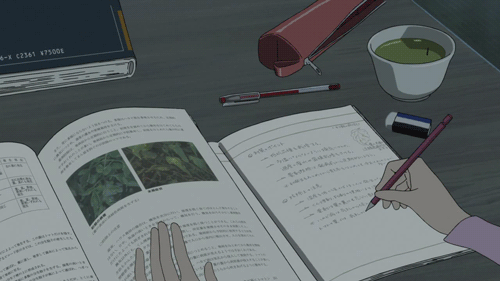
117 notes
·
View notes
Photo












Bunnies for Chinese New Year/Spring Festival (Chunjie) by 东予薏米
3K notes
·
View notes
Text
Demonstrating lianbizi 連筆子; writing without lifting the pen from the paper
[eng by me]
971 notes
·
View notes
Photo





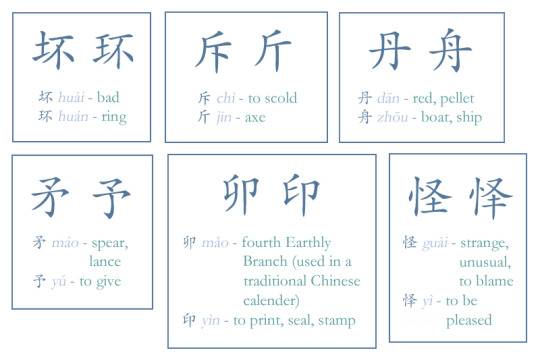
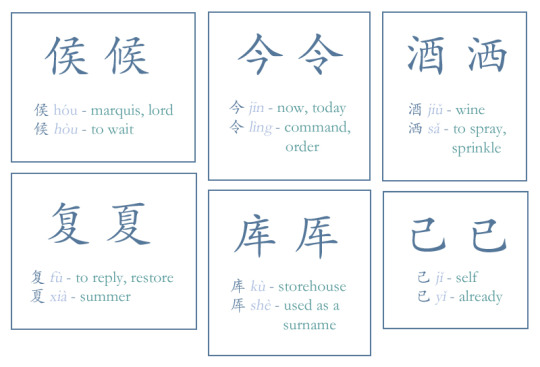
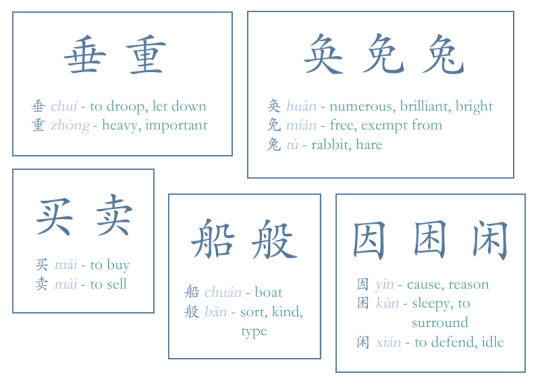
Adapted from the series Easily Confused Chinese Characters
4K notes
·
View notes
Text




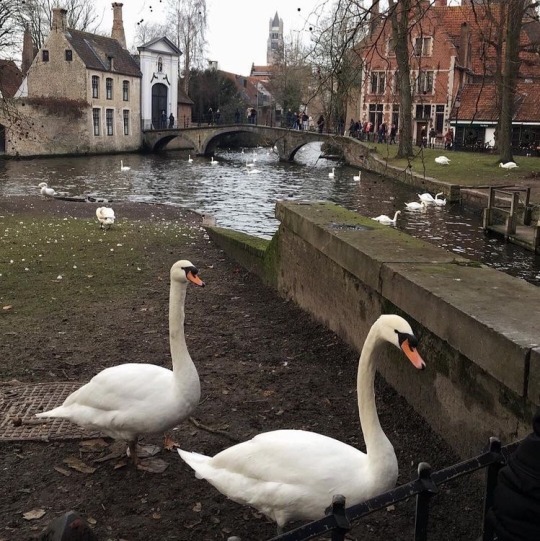



If the compass breaks,
then follow your heart
And I hope it leads you
right back into my arms
14K notes
·
View notes
Text
Mandarin resources (free) Beginner.
Index for this post:
HSK word list
Tones
Pinyin
Web courses
Flashcards
Dictionaries
Sentences
Extensions (Chrome-Firefox)
Book recs
Input (Reading/Videos/TV shows and Films)
Other
Last edited/updated: 19 / Feb / 2022 = (edit 16)
HSK word list
HSK 1 Hsk.Academy Simplified and Traditional (with pinyin), exercises and sentences examples.
HSK 2-6
1500 Most Common Chinese Characters (edit 17): Definitions and audio pronunciations + search in the dictionary link.
TONES
Digmandarin *Tone explanation (but with words with more than 1 syllable, which is great because the hard part is when a word has 2 o more syllables)
Sinosplice More tones! (pair drills)
*Youtube vid explaining tones and exceptions (like tone modification and the half 3 and 4 tones) Link Link2 (edit 1)
** Tone pairs youtube vid by Yoyo Chinese (Individual tones 0:00-8:30 // Tone pairs 8:30-27) Link (edit 10)
Tone pairs chart + Exercises from said chart (edit 9)
Tone pairs + audio for all the tone combinations Link (Edit 11)
*Exercises: (edit 7)
which tones do you hear (tone pairs)
another which tones do you hear (single syllab or tone pairs)
match pinyin + tone to the sound
match the sound to the pinyin + tone
differenciate between tones
tone speaking practice (listen and repeat recording yourself)
Seguir leyendo
2K notes
·
View notes
Text
Chinese Measure Words
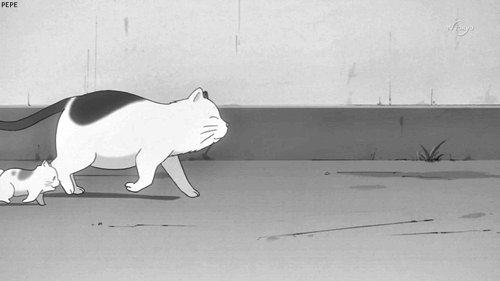
个 gè: for people, abstract things and objects | Ex: 我有一个老师。
口 kǒu: for family people | Ex: 我家有四口人。
只 zhī: for animals | Ex: 我爸爸家有三只狗。
条 tiáo: for long and narrow things | Ex: 她有两条鱼。
张 zhāng: for flat things | Ex: 教室里有五张桌子。
把 bǎ: for objects that can be grasped by hand | Ex: 我房间里有一把椅子。
本 běn: for books | Ex: 桌子上有四本书。
支 zhī: for long and thin things | Ex: 笔袋里有一支笔。
家 jiā: for establishments (house, hotel …) | Ex: 我哥哥开了一家公司。
块 kuài: for portions or pieces | Ex: 来吃块西瓜吧。
岁 suì: for years (old) | Ex: 我今年40岁。
棵 kē: for trees | Ex: 这棵树又高又大。
台 tái: for machines | Ex: 这台电脑是新买的。
双 shuāng: for pairs | Ex: 一双筷子。
辆 liàng: for vehicles | Ex: 一辆汽车。
篇 piān: for articles and texts | Ex: 这篇报道是我写的。
节 jié: for time periods | Ex: 我们下午只有一节课。
杯 bēi: for liquid (glass; cup) | Ex: 我有一杯牛奶。
2K notes
·
View notes


